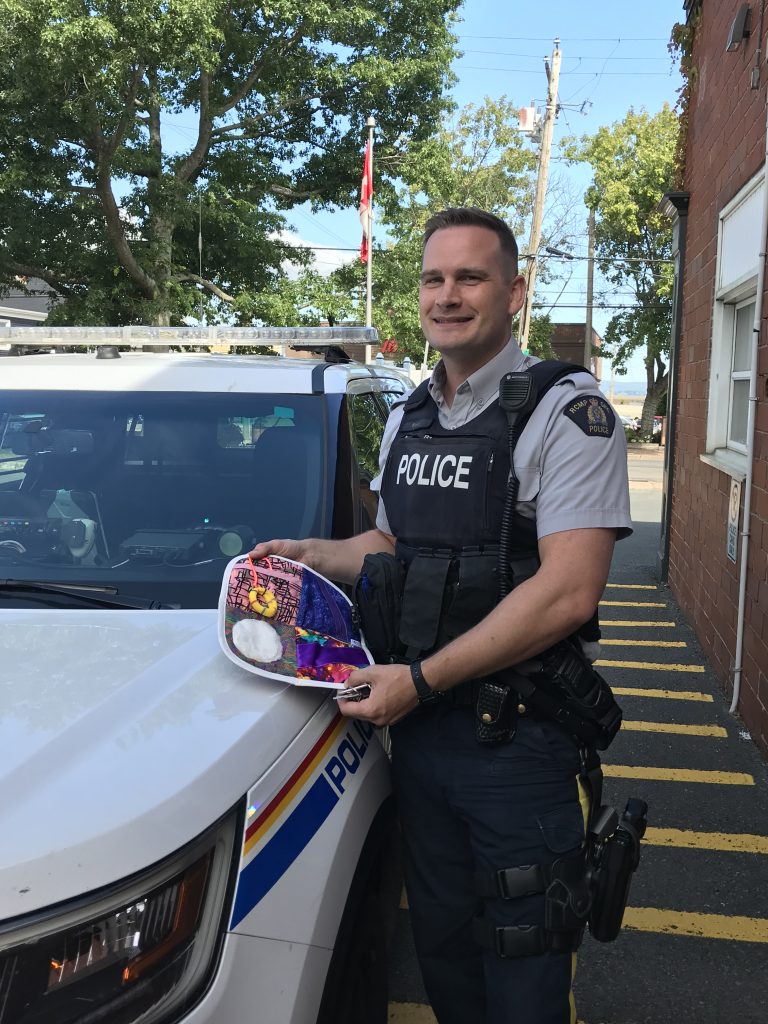
Features
Fidget quilts: Helping Kings District RCMP better interact with dementia patients
October 9, 2019 By Zeba Khan
 Const. Nathan Black of Wolfville RCMP. Each member of Kings District RCMP now carries a miniature fidget quilt at all times.
Photo submitted by Michelle Parker.
Const. Nathan Black of Wolfville RCMP. Each member of Kings District RCMP now carries a miniature fidget quilt at all times.
Photo submitted by Michelle Parker. Michelle Parker, a co-ordinator of Kings County Seniors’ Safety Society, remembers a woman with dementia who went missing twice in the Nova Scotia community during the holidays last winter.
The woman was not from Canada, did not speak English and lived an hour and half away from her family. Her daily routine included leaving her home, walking to certain stores and then going back home.
“Over the holidays, when the stores were closed, it completely threw her off since her routine changed… Caseworkers went to check on her, she wasn’t there,” Parker explained. “Police are the first line of contact in these cases. So, having that one extra tool to be able to de-escalate the situation really helps take things from a crisis to a manageable point.”
That extra tool for Kings District Royal Canadian Mounted Police (RCMP) officers comes in the form of a “fidget quilt,” or an activity blanket.
Beth McBrine and Cathy Dunbar — known as “The 2 Fidgeteers” — are the inventors of the fidget quilts. They initially created them to help family members with dementia and have now distributed almost 700 quilts to care givers and police offices.
There are two types of fidget quilts: small quilts with four panels, and larger quilts with 20 panels. The quilts are made of a variety of sensory pieces, activity panels, and textures like Velcro or silk.
Each RCMP member in the district now carries a small quilt in their duty bag for initial interactions and each detachment carries a large quilt, often used for follow-ups.
For initial interactions, a highly agitated person with dementia is isolated. RCMP members sit the person down and give them the small quilt to focus on. Finally, a communication strategy is used to help the person calm down.
For follow-ups, a large quilt is provided to family members of dementia patients.

Left to right: Scott Leier (Seniors’ Safety Society board member), Michelle Parker (Seniors’ Safety Society co-ordinator), Beth McBrine (The 2 Fidgeteers), Cathy Dunbar (The 2 Fidgeteers), and Sgt. Andrew Buckle (Kings District RCMP) display a full-size and some miniature fidget quilts. Photo submitted by Michelle Parker.
“[An individual] could get up to leave the home and go wandering sometimes… If you could give them the large quilt for 20 minutes, it can allow a family member to do the laundry and have a shower,” Parker said.
Parker reports that fidget quilts have positively improved the quality of life of dementia patients. She recalls an incident with a woman who had rubbed her hand raw due to constant agitation and worrying.
“She can get easily confused, lives alone, gets overwhelmed and doesn’t know what to do, for instance, or she’ll call 911 or 211 or 811,” Parker said. “So, I gave her one of the larger fidget quilts. She is actually now seeing some regrowth on the skin on her hand.”
The patient is now placing fewer calls and is able to sit in her rocking chair, with her music on, Parker reported.
The future of fidget quilts seems bright. Parker has had inquiries about the quilts from around the province already.
They can also be used for children with autism or some attention deficit concerns.
“I don’t think you need to have a strict diagnosis like autism or dementia for the concept to work for you, once it starts getting out there, the applications are just going to grow and grow,” Parker said. “We’re looking at how we can realistically roll this out further. If this were to go national, that would be great.”
Zeba Khan is a Centennial College student and an intern at Blue Line.
Print this page